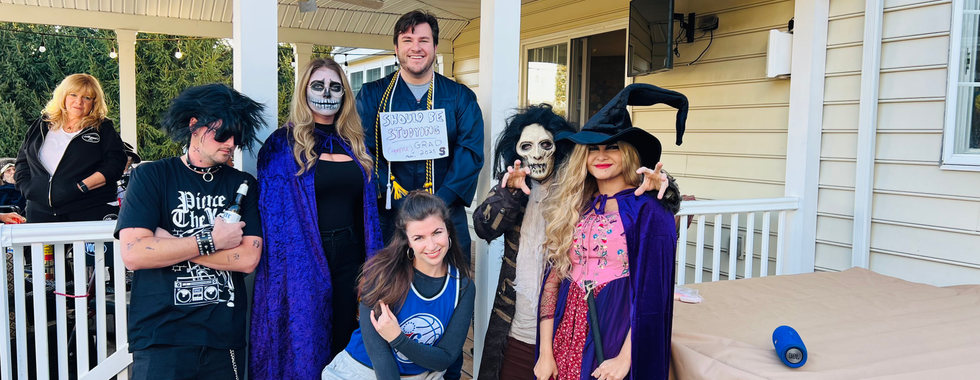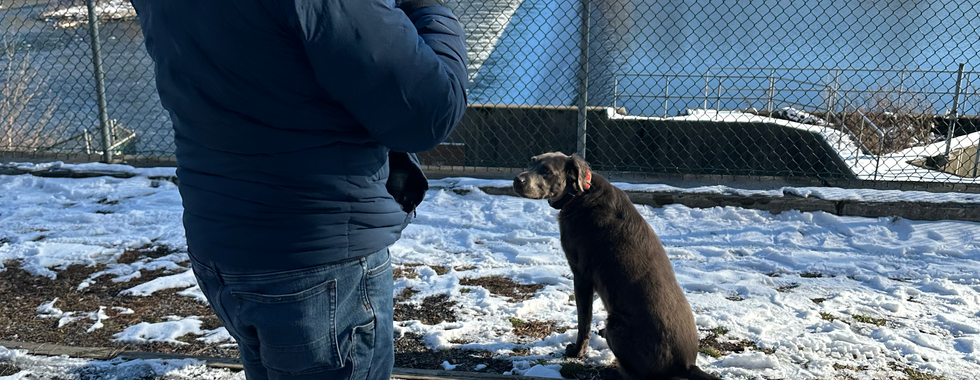A Letter to First-Year Grief
- Chris Fiegel

- Mar 3
- 5 min read
Dear First-Year Grief,
There’s this moment. It’s like taking a deep breath in, but you don’t know when you’ll let it out.
You’re stuck. You see the world around you with all its beauty and drudgery. All of its fears and miracles, front and center. Its brokenness and depths reflected in your soul. Any single word could be your tipping point — an inescapable quicksand. Your eyes widen, heart racing, tears swell — the room feels crushing.
You take a walk. Then, you listen to a voice.
It says you’re okay. You’ve got this. This too shall pass. It tells you to breathe — to find a moment to yourself. It calms your heart. It’s warm, safe and inviting. It’s compassionate and humble. A gentle guide through uncertain roads. An impermanent and honest truth. A kind, loving and authentic presence.
It was just over 3 years ago that I experienced my first panic attack. It was everything above and more, but I count myself as one of the lucky ones. Angels surrounded and supported me that day, and I am forever grateful to each of them.
I would not be the person I am today without them.
Today marks one year since my father’s passing. He passed away at 62 years old with my mom by his side. As I write this, I’m sitting on the fourth floor of S.I. Newhouse School of Public Communications in Syracuse, NY (where it snows seemingly every other day in winter), looking out at an orange, glowing “S” in the National Veteran Resource Center, reflecting upon this past year. My dad was an United States Air Force veteran, entertainer, songwriter, entrepreneur, volunteer, brother, uncle, nephew, son, husband, father, and so much more — above all, he told the truth, best he could, at all times.

My Reflection of Year One
No one can tell what the first year of grief will look like for you. In my experience, it’s characterized by moments of sorrow, pain, frustration, distress, discomfort, doubt, redemption, courage, strength, resilience, community, love, hope, and a faint-but-real sense of serenity.
In many ways, Dad is out of chronic pain.
Still, I miss him. We all do.
In year one, the life lessons are plentiful. Dad’s favorite number was eight because it resembled the infinity symbol when turned horizontally, so here are eight truths/lessons from this past year:
Truth No. 1 — grief is hard but not impossible; keep moving forward, and don’t lose hope.
Truth No. 2 — be kind to yourself; kindness reflects character.
Truth No. 3 — anything worth doing is going to be hard; do it anyway and do it the right way.
Truth No. 4 — life’s imperfect and changes every moment; lean on your trusted loved ones, and be there for them.
Truth No. 5 — when you make a mistake, apologize, make amends wherever possible so long as you do no harm, and do the next right thing; be truthful.
Truth No. 6 — find a way; there’s always a third option.
Truth No. 7 — when you feel hopeless, look for those who are helping others.
Truth No. 8 — love wins, always.
Take what you like, and leave the rest.
Here’s a brief list (not exhaustive) of what was good in the last year:
Moved to Syracuse in the summer — new city, different adventures
Made connections and lasting friendships with my cohort, colleagues, peers and beyond (we got this, y'all 💪)
Completed nearly 75% of a masters degree program, despite considering taking a leave of absence when it got really hard
Maintained professional role with Historic Hotel Bethlehem, continuing to tell the story of its legacy and its guests, associates, and community, which won Best Social Media of a Historic Hotel in the 2024 Historic Hotels of America Awards of Excellence
Licensed a photograph for the Syracuse Alumni 2025 calendar and designed various projects related to traumatic brain injury research
Spoke at the Fall 2025 Newhouse Impact Symposium about the overlap of marketing, AI, hospitality and design
Co-edited (with both pleasure and privilege) the Newhouse Impact Journal Vol. 2 alongside the incredible Gina Luttrell, PhD and Nick Bowman, PhD
Worked with top-tier industry professionals in both the CBS News Misinformation and Disinformation workshop and Pixels & Print workshop, co-championing the overhaul of the soon-to-be-implemented Branding Guidelines for Empower Parkinson, Inc. over a 48-hour development period
Embraced the authentic stories of my loved ones, growing and finding their ways
Photographed my sister perform the National Anthem for the first sold-out Savannah Bananas game at the Philadelphia Phillies’ Citizens Bank Park
Attended a beautiful wedding and had some of the best eggs benedict and chocolate chip pancakes I’ve ever tried
Designed an album cover for a family friend
Collaborated with my sister for the revamp of her music for 2025
Walked just over 1,000 miles with different outdoor explorations along the way
With the good come the struggles. Here are some key moments and areas for improvement:
Physical health was less than ideal, but we’re getting back on the right track
Nutrition — solo life leaves a lot of opportunity to indulge; be more mindful
Time and task management — the bane of the entrepreneur and graduate student life, but proactive steps go a long way (tools that are helping: ClickUp, Google Workspace & Gemini, Claude, Quickbooks)
Car accident and COVID — you can’t prepare for everything; communicate, be thoughtful, take breaks, and work through the tough moments
Imposter syndrome can easily exist in your daily life; know that you’re more than enough and keep moving forward to quiet the doubt
Set boundaries — as Dr. Luttrell once advised, “The work will always be there, and, in some ways, it will never be enough (just always adding more), so set yourself up for success with healthy boundaries and prioritize. You can only take care of others if you take care of you.”
Get more sleep — my program chair, the ever-delightful Ken Harper, told us, “It’s a masters program; it’s okay to lose a little sleep. Just take care of yourself.”
If these experiences help you along your journey, I’m glad. I remain mindful that first-year grief with a parent that lived up to that title (and more) is a different experience from someone who may experience it with a parent who did not. Moreover, I’ve previously shared the lessons from Dad’s shortcomings, knowing that we, in our shared humanity, are no stranger to failure and mistakes.
Still, I hold hope. I don’t know what’s next. There are some very exciting opportunities ahead, accompanied by the unknowns. For me, I know that moments of anxiety and doubt will creep in from time-to-time; however, I've learned that, sometimes, the best way to face darkness is to bring it into the light. Soon after that panic attack in 2022, I was gifted a piece of advice from my former boss:
“Whatever you decide and whatever happens next, keep your heart open. Trust your gut.” - Robert Stern, PhD
Surround yourself with good people. In the words of Helen Keller (1903), “Optimism that does not count the cost is like a house builded on sand. A man must understand evil and be acquainted with sorrow before he can write himself an optimist and expect others to believe that he has reason for the faith that is in him.”
Until next time, be kind. Find your way. We got this.
With love,
Chris
Author's note: I do not make any revenue through the links used in this article. I hope they are useful links and tools for you and your journey. If you have any questions or concerns, please reach out to chris@chrisfiegel.com.






























































































Comments